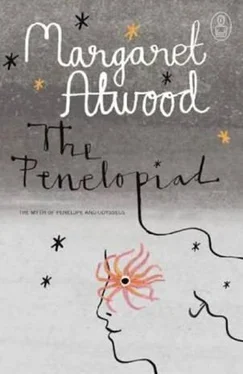His father, Laertes, and his mother, Anticleia, were still in the palace at that time; his mother had not yet died, worn out by watching and waiting for Odysseus to return and, I suspect, by her own bilious digestive system, and his father had not yet quitted the palace in despair at his son’s absence to live in a hovel and penalise himself by farming. All of that would happen once Odysseus had been gone for years, but there was no foreshadowing of it yet.
My mother-in-law was circumspect. She was a prune-mouthed woman, and though she gave me a formal welcome I could tell she didn’t approve of me. She kept saying that I was certainly very young.
Odysseus remarked dryly that this was a fault that would correct itself in time.
The woman who gave me the most trouble at first was Odysseus’s former nurse, Eurycleia. She was widely respected according to her because she was so intensely reliable. She’d been in the household ever since Odysseus’s father had bought her, and so highly had he valued her that he hadn’t even slept with her. ‘Imagine that, for a slave woman!’ she clucked to me, delighted with herself.
‘And I was very good-looking in those days!’ Some of the maids told me that Laertes had refrained, not out of respect for Eurycleia, but from fear of his wife, who would never have given him any peace if he’d taken a concubine. ‘That Anticleia would freeze the balls off Helios,’ as one of them put it.
I knew I should have reprimanded her for impudence, but I couldn’t repress my laughter.
Eurycleia made a point of taking me under her wing, leading me about the palace to show me where everything was, and, as she kept saying, ‘how we do things here’. I ought to have thanked her for it, with my heart as well as my lips, for there is nothing more embarrassing than to make a slip of manners, thus displaying your ignorance of the customs of those around you. Whether to cover the mouth when you laugh, on what occasions to wear a veil, how much of the face it should conceal, how often to order a bath Eurycleia was an expert on all such matters. That was lucky, for my Mother-in-law, Anticleia who ought to have taken charge in this way was content to sit silently and say nothing while I made a fool of myself, a tight little smile on her face. She was happy that her adored son Odysseus had pulled off such a coup a princess of Sparta was not to be sneezed at but I think she would have been better pleased if I’d died of seasickness on the way to Ithaca and Odysseus had arrived home with the bridal presents but not the bride. Her most frequent expression to me was, ‘You don’t look well.’
So I avoided her when I could, and went around with Eurycleia, who was at least friendly. She had a fund of information about all the neighbouring noble families, and in that way I learned a great many discreditable things about them that would be useful to me later on.
She talked all the time, and nobody was the world’s expert on Odysseus the way she was. She was full of information about what he liked and how he had to be treated, for hadn’t she nursed him at her own breast and tended him when he was an infant and brought him up as a youth? Nobody but she must give him his baths, oil his shoulders, prepare his breakfasts, lock up his valuables, lay out his robes for him, and so on and so forth. She left me with nothing to do, no little office I might perform for my husband, for if I tried to carry out any small wifely task she would be right there to tell me that wasn’t how Odysseus liked things done.
Even the robes I made for him were not quite right - too light, too heavy, too sturdy, too flimsy. ‘It will do well enough for the steward,’ she would say, ‘but surely not for Odysseus.’
Nonetheless, she tried to be kind to me in her own way. ‘We’ll have to fatten you up,’ she would say, ‘so you can have a nice big son for Odysseus! That’s your job, you just leave everything else to me.’ As she was the nearest thing there was to someone I could talk to besides Odysseus, that is I came to accept her in time.
She did make herself invaluable when Telemachus was born. I am honour bound to record that. She said the prayers to Artemis when I was in too much pain to speak, and she held my hands and sponged off my forehead, and caught the baby and washed him, and wrapped him up warmly; for if there was one thing she knew as she kept telling me—it was babies. She had a special language for them, a nonsense language ‘Uzzy woo,’ she would croon to Telemachus—when drying him after his bath ‘A google woogle poo!’ and it unsettled me to think of my barrel-chested and deep-voiced Odysseus, so skilled in persuasion, so articulate, so dignified, as an infant lying in her arms and having this gurgling discourse addressed to him.
But I couldn’t begrudge her the care she took of Telemachus. Her delight in him was boundless. You’d almost have thought she’d given birth to him herself.
Odysseus was pleased with me. Of course he was. ‘Helen hasn’t borne a son yet,’ he said, which ought to have made me glad. And it did. But on the other hand, why was he still—and possibly always thinking about Helen?
X. The Chorus Line: Birth of Telemachus, An Idyll
Nine months he sailed the wine-red his mother’s blood
Out of the cave of dreaded Night, sleep,
Of troubling dreams he sailed
In his frail dark boat, the boat of
Through the dangerous ocean of his mother he sailed
From the distant cave where the men’s lives are spun,
Then measured, and then cut short
By the Three Fatal Sisters, intent o gruesome handcrafts,
And the lives of women also are two into the strand.
And we, the twelve who were later to his hand
At his father’s relentless command,
Sailed as well, in the dark frail boats ourselves
Through the turbulent seas of our sw and sore-footed mothers
Who were not royal queens, but a and piebald collection,
Bought, traded, captured, kidnapped I
serfs and strangers.
After the nine-month voyage we came shore,
Beached at the same time as he was, by the hostile air,
Infants when he was an infant, wailing as he wailed,
Helpless as he was helpless, but ten ti more helpless as well,
For his birth was longed-for and feasted our births were not.
His mother presented a princeling. Our various mothers
Spawned merely, lambed, farrowed, littered,
Foaled, whelped and kittened, brooded, hatched out their clutch.
We were animal young, to be disposed will,
Sold, drowned in the well, traded, used discarded when bloomless.
He was fathered; we simply appeared,
Like the crocus, the rose, the sparrows engendered in mud.
Our lives were twisted in his life; we all were children
When he was a child,
We were his pets and his toythings, me sisters, his tiny companions.
We grew as he grew, laughed also, ran ; ran,
Though sandier, hungrier, sun-speckled, most days meatless.
He saw us as rightfully his, for whatever purpose
He chose, to tend him and feed him, to wash him, amuse him,
Rock him to sleep in the dangerous boats of ourselves.
We did not know as we played with him there in the sand
On the beach of our rocky goat-island, close by the harbour,
That he was foredoomed to swell to our cold-eyed teenaged killer.
If we had known that, would we have drowned him back then?
Young children are ruthless and selfish: everyone wants to live.
Twelve against one, he wouldn’t have stood a chance.
Would we? In only a minute, when nobody else was looking?
Pushed his still-innocent child’s head under the water
With our own still-innocent childish nursemaid hands,
And blamed it on waves. Would we have had it in us?
Читать дальше












